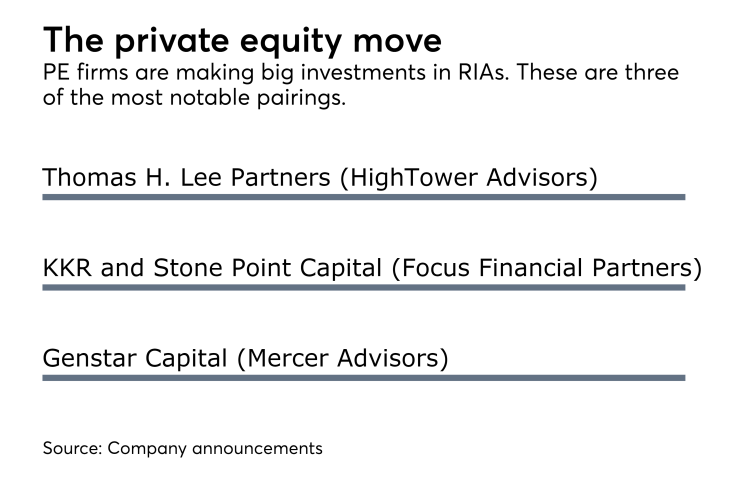What does HighTower Advisors' $100 million recapitalization deal with private equity firm Thomas H. Lee Partners mean for the financial advisory business?
It's a major endorsement of the RIA business model, industry observers agree, and underscores the massive influx of PE money into the space — and the subsequent questions those investments raise.
"The HighTower deal is a clear sign that the RIA industry is the place to be in financial services," says Dave Welling, CEO of Mercer Advisors, an $11 billion advisory firm owned by private equity firm Genstar Capital. "What used to be a cottage industry is now seeing outside capital step in and take ownership of aggregators and national RIA platforms, which is accelerating the trend of RIAs continuing to gain market share."
Or, as consultant John Furey, principal of Advisor Growth Strategies, puts it, "The reality in our industry is that outside investment is required for firms seeking to grow at the rate Hightower desires."
That much needed capital is expected to be used for mergers and acquisitions and investment in talent, infrastructure and technology.
WHAT'S THE CATCH?
But what strings are attached?
One area of concern, warns Brian Hamburger, CEO of MarketCounsel, the legal and compliance consultancy firm, is the potential conflict of interest if private equity firms view RIAs as distribution channels for other financial products they have interests in.
"Firms have to draw a very bright line when it comes to how a private equity investment impacts investment strategy," says Hamburger, whose firm has done legal work for HighTower. "If it's viewed as new found distribution channel that's highly problematic and fraught with conflicts.

"Some firms may take a soft sell approach and have companies they have interests in make calls to each other to discuss the products they sell," Hamburger adds. "But if they take a harder approach and demand a seat on the investment committee that will clearly be of interest to regulators as they investigate the wave of new investments in this industry."
The issue raises an important question, agrees Chip Roame, managing partner of Tiburon Strategic Advisors.
"When considering the terms of the deal," Roame asks, "does a buyer get any preferred product distribution rights?"
TIME-FRAME ISSUES
The high-return investing priorities and short-term time-frame of a private equity firm, typically five to seven years, are also concerns.
"There is always risk to those who sell a stake in their business to a private equity firm," says Mark Tibergien, chief executive officer of Pershing Advisor Solutions. "Now they have a passive shareholder with a high expectation of return. This can result in more efficiencies in faster growth, but the pressure to produce returns may not be in line with the advisor’s definition of success."
"Does an RIA buyer get any preferred product distribution rights?" asks Chip Roame.
Consultant Jamie McLaughlin sees a paradox in private equity interest in advisory firms.
"The RIA model is in incontrovertible demand, but that is largely due to their operating as independent fiduciaries," McLaughlin says. "Can RIAs assert the same alignment of interest when they accept capital from a PE firm or any other investor who has short-dated capital?"
The shorter-term time horizon of private equity firms can also be detrimental in other ways, maintains Brent Brodeski, CEO of Savant Capital Management.
The HighTower deal, Brodeski says, "seems to have been driven by the fact that the institutional investors needed to exit to comply with their fund mandate and timeframe. This is one of the challenges that RIAs who accept PE and venture money from institutional investors have with shorter-term time horizons. Lots of effort goes into recapitalizing and this can be a big distraction to operating and growing the business."
Attorney and industry consultant Corey Kupfer notes a final irony in private equity's role in inflating the size and scale of the advisory business.
"As these independent RIA platforms become larger and larger through aggregation, investment and scale," Kupfer says, "will they be facing some of the wirehouse-type issues that advisors escaped from? Will dealing with scale and managing to the lowest common denominator start creeping into these mega-RIA platforms, triggering frustration and dissatisfaction of advisors and clients?"





